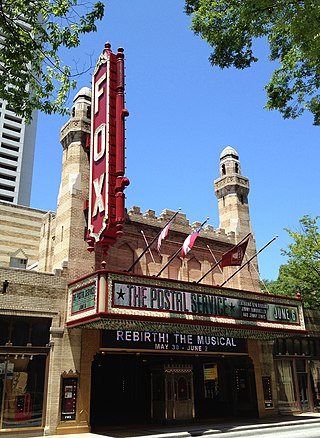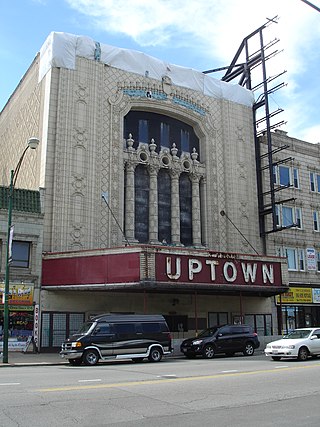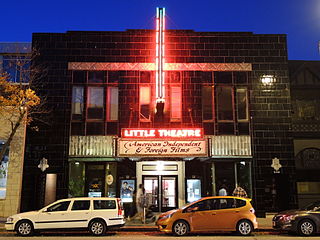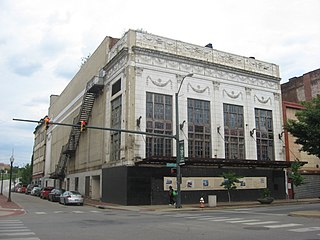
Quo Vadis is a 1951 American epic film set in ancient Rome during the final years of Emperor Nero's reign, based on the 1896 novel of the same title by Polish Nobel Laureate author Henryk Sienkiewicz. Produced by Metro-Goldwyn-Mayer and filmed in Technicolor, it was directed by Mervyn LeRoy from a screenplay by S. N. Behrman, Sonya Levien, and John Lee Mahin. It is the fourth screen adaptation of Sienkiewicz's novel. The film stars Robert Taylor, Deborah Kerr, Leo Genn, and Peter Ustinov, and features Patricia Laffan, Finlay Currie, Abraham Sofaer, Marina Berti, Buddy Baer, and Felix Aylmer. Future Italian stars Sophia Loren and Bud Spencer appeared as uncredited extras. The score is by Miklós Rózsa and the cinematography by Robert Surtees and William V. Skall. The film was released by Metro-Goldwyn-Mayer on November 2, 1951.

Seattle Center is an entertainment, education, tourism and performing arts center located in the Lower Queen Anne neighborhood of Seattle, Washington, United States. Constructed for the 1962 World's Fair, Seattle Center's landmark feature is the 605 ft (184 m) Space Needle, an official city landmark and globally recognized symbol of Seattle's skyline. Other notable attractions include the Pacific Science Center, Climate Pledge Arena, and Museum of Pop Culture (MoPOP), as well as McCaw Hall, which hosts both the Seattle Opera and Pacific Northwest Ballet. The Seattle Center Monorail provides regular public transit service between Seattle Center and Westlake Center in Downtown Seattle, and is itself considered a tourist attraction.

The Fox Theatre, a former movie palace, is a performing arts venue located at 660 Peachtree Street NE in Midtown Atlanta, Georgia, and is the centerpiece of the Fox Theatre Historic District.

A movie palace is any of the large, elaborately decorated movie theaters built between the 1910s and the 1940s. The late 1920s saw the peak of the movie palace, with hundreds opening every year between 1925 and 1930. With the advent of television, movie attendance dropped, while the rising popularity of large multiplex chains in the 1980s and 1990s signaled the obsolescence of single-screen theaters. Many movie palaces were razed or converted into multiple-screen venues or performing arts centers, though some have undergone restoration and reopened to the public as historic buildings.
Landmark Theatres is a movie theatre chain founded in 1974 in the United States. It was formerly dedicated to exhibiting and marketing independent and foreign films. Landmark consists of 34 theatres with 176 screens in 24 markets. It is known for both its historic and newer, more modern theatres. Helmed by its President Kevin Holloway, Landmark Theatres is part of Cohen Media Group.

The Little Theatre in Rochester, New York, commonly known as "The Little" is a movie theatre located on historic East Avenue in downtown Rochester, New York and a modest non-profit multiplex specializing in art film, including independent and foreign productions outside the United States.
Harkins Theatres is an American movie theater chain with locations throughout the Southwestern United States. Harkins Theatres is privately owned and operated by its parent company, Harkins Enterprises, LLC. The company operates 31 theaters with 487 screens throughout Arizona, California, Colorado, and Oklahoma. It is the 7th largest movie theater circuit in North America and the largest family-owned theater chain in the United States.

The Woods Theatre was a movie palace at the corner of Randolph and Dearborn Streets in the Chicago Loop. It opened in 1918 and was a popular entertainment destination for decades. Originally a venue for live theater, it was later converted to show movies. It closed in 1989 and was demolished in 1990.

Malco Theatres, Inc. is a movie theatre chain that has remained family owned and operated for over one hundred years. It has been led by four generations of the Lightman family. The company has 36 theatre locations with over 371 screens in six states. Malco also operates three bowling centers and a family entertainment center in southern Louisiana and a family entertainment center in Oxford, Mississippi.
Richard Layton Crowther,, was an architect and author who achieved international renown for his progressive holistic compositions, particularly his pioneering designs employing passive solar energy.

The Liberty/Paramount Theatre was an early movie palace located on West Federal Street and Hazel Avenue in Youngstown, Ohio.

An atmospheric theatre is a type of movie palace design which was popular in the late 1920s. Atmospheric theatres were designed and decorated to evoke the feeling of a particular time and place for patrons, through the use of projectors, architectural elements and ornamentation that evoked a sense of being outdoors. This was intended to make the patron a more active participant in the setting.
The Cooper Foundation of Lincoln, Nebraska, is a charitable and educational organization established in 1934 by Joseph H. Cooper, a long-time theater owner and former partner of Paramount Pictures. It supports nonprofit organizations in Lincoln and Lancaster County, Nebraska.

The Landmark Theatre, originally known as Loew's State Theater, is a historic theater from the era of movie palaces, located on South Salina Street in Syracuse, New York, United States. Designed by Thomas W. Lamb, it is the city's only surviving example of the opulent theatrical venues of the 1920s. The Landmark is on the National Register of Historic Places.
Emagine Entertainment Inc. is an American movie theater chain based in Troy, Michigan, operating 28 cinemas in Michigan, Illinois, Indiana, Minnesota, and Wisconsin. Emagine is ranked as the 9th largest theatre chain in North America.

Quo Vadis is a 1924 Italian silent historical drama film directed by Gabriellino D'Annunzio and Georg Jacoby and starring Emil Jannings, Elena Sangro, and Lillian Hall-Davis. It is based on the 1896 novel Quo Vadis by Henryk Sienkiewicz which was notably later adapted into a 1951 film.

At the advent of the 20th century, the city of Portland, Oregon, was among the first on the United States West Coast to embrace the advent of the silent and feature film. The city's first movie palace, the Majestic Theatre, opened in 1911. By 1916, Portland had "the finest array" of movie houses on the West Coast relative to its population, pioneering venues dedicated exclusively to screening films. The popularization of the sound film in the early 1920s resulted in another boom of new cinemas being constructed, including the Laurelhurst, the Hollywood Theatre, and the Bagdad Theatre, the latter of which was financed by Universal Pictures in 1926.

Quo Vadis, Aida? is a 2020 internationally co-produced war drama film written, produced and directed by Jasmila Žbanić. An international co-production of twelve production companies, the film was shown in the main competition section of the 77th Venice International Film Festival.















